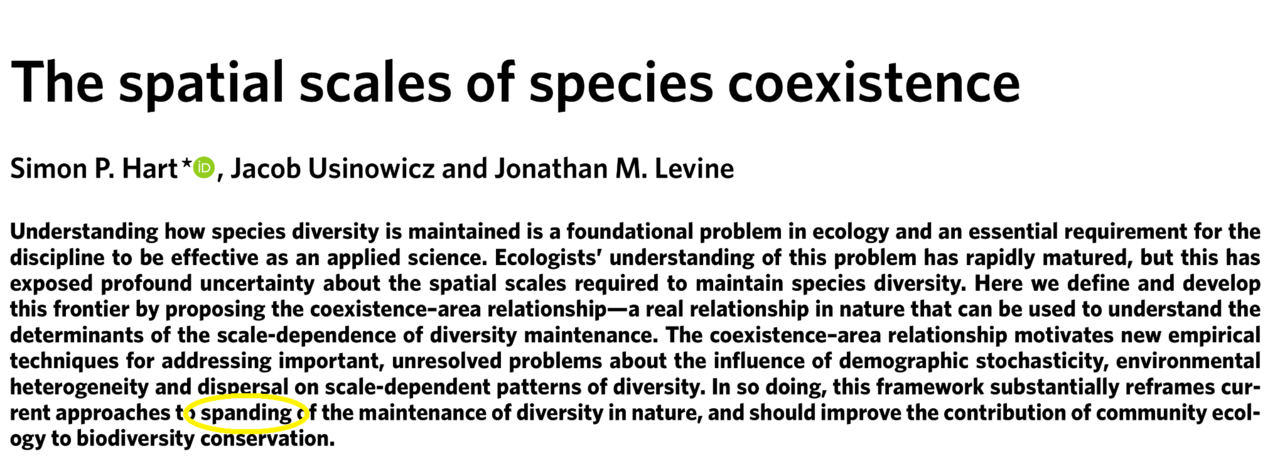Those of you who have recently enjoyed reading 'The spatial scales of species coexistence' by Simon Hart, Jacob Usinowicz & Jonathan Levine may have been a little puzzled by the word 'spanding' in the abstract. Were the authors inventing a new gerund that had some relation to Gould and Lewontin's spandrels? Sadly, the more prosaic answer is that it was entirely the journal's mistake - at the very final stage of proofing, after the authors had signed off, we accidentally spliced together two half sentences. This has now been corrected, but you might be interested in a bit of the backstory.
Much like an organismal phenotype, the final polished article you read, either as PDF or HTML, is the result of a lot of complex and often not very pretty coding under the hood. At risk of stretching the analogy a bit far, our system has, over the years, acquired a lot of spandrels and inefficiencies. One of these inefficiencies is that the connection between the PDF and HTML versions involved error-prone manual processes. It was clearly time for a clean up of the system, what one might term 'de-spanding'.
Over the past year or so, technical folks across Springer Nature have been working on a new, more efficient system, in which PDF and web versions of articles are much more smoothly integrated. There are various other advantages to the new system, such as faster and more flexible publishing schedules. However, as with all major changes, a lot needed to be tested and a large number of people needed to learn to do things in very different ways.
A lot of testing has been done behind the scenes on dummy articles, but eventually one journal had to take the plunge. Step forward, Nature Ecology & Evolution. I'd like to think that we were selected because we are a new journal without too many spandrels, and also one that is in healthy shape in terms of publishing a good volume of content across a wide range of article types. Indeed, I did overhear the slightly unflattering phrase 'a pipe-clearing journal'. However, I'm probably kidding myself and maybe we were just chosen because we have a gullible chief editor who was thought unlikely to complain.
Either way, since the end of June, all of our content has been published in the new system, culminating in the August issue being the first full issue published that way. The hope was that readers would not notice the difference at all, with all the myriad changes under the hood staying right there. Authors, on the other hand, were supposed to notice, as the new system includes a completely new way of checking page proofs. The aim of this new system is to allow authors to make changes directly themselves, reducing the potential for mistakes and the number of iterations needed to get the final version ready. You won't be hugely surprised to hear that there have been a few teething problems, but hopefully we will quickly start to feel the benefits of the new system. We would greatly value feedback from recent authors on how they have found the new way of working.
Of course, as it turned out, readers did notice the change. Most egregious was 'spanding', which came about as a side-effect of changes in workflows. The more eagle-eyed may have noticed a string of much more minor glitches, most of which have now been cleaned up. These range from publication occurring before the officially advertised time to inconsistencies on our homepage to minor problems with the fonts of Greek letters.
We continue to monitor the new system closely, but we hope we are now moving to a situation where the benefits far outweigh the costs. Our experience also allows our colleagues on the other Nature Research journals to follow smoothly in our footsteps, now that we have cleared the pipes for them. It's been a bumpy few weeks for both editors and even more so for our amazing production colleagues who produce the polished articles after we hand them clunky Word documents. Hopefully, our process of 'de-spanding' has now succeeded in both senses of the newly invented word, and it will be more fondly remembered than 'covfefe'.







Please sign in or register for FREE
If you are a registered user on Research Communities by Springer Nature, please sign in